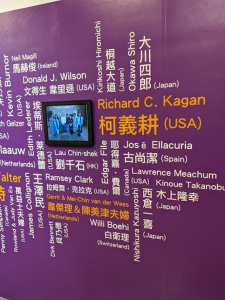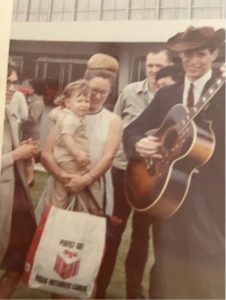
3D chess is one of the most complex games that humans play.
From 1965-67, I studied Chinese in Taiwan, Republic of China. Although I was a dedicated student, I found myself more involved in human rights opposing martial law imposed by President Chiang Kai-shek and his political party, the Kuomintang,
From 1965-67, I studied Chinese in Taiwan, Republic of China. Although I was a dedicated student, I found myself more involved in human rights opposing martial law.
My most significant political activity was co-planning the escape of Peng Ming-min from the island. He was a vanguard for the Taiwan Independence Movement who was forbidden to leave the country.
I happened to live across the street from an American missionary couple who opposed their church’s orientation to the Chiang Kai-shek family and the KMT regime. Gradually, the man learned from his own parishioners and others of his faith about the suffering of the Taiwanese. This man secretly invited Peng to his home where we discussed the goal of independence and began plans for Peng’s escape. Peng had been charged with treason for his public call for an independent Taiwan. After a short prison sentence, he was confined to his home in Taipei.
During this period, besides the many visits at the missionaries’ home, I had three significant meetings regarding Peng’s presence.
Once, I was required to deliver a message to Peng that was top secret. It was about some political issues on the island regarding his freedom. At that time, he was living in a Japanese-style house, carefully guarded, near Taiwan University where he was under house arrest. I disguised myself with a raincoat and helmet, mounted my Honda 75cc motorcycle, and drove right into his living room. There I delivered the letter and then drove out. I was chased by a military jeep but managed to scoot into an alley that was only wide enough for bicycles and small carts. The next day, in my casual clothes, I walked by Peng’s house and was satisfied to find that the guards had now adapted their gear with large police motorcycles.
Another day, I had a friendly visit from an embassy staffer who worked closely with the American ambassador. This individual had secretly worked undercover for the CIA at a Communist Youth Festival in Moscow. Subsequently, he learned Chinese, joined the State Department and was posted in Taipei. Soon after his posting, the right-wing press in America “discovered” that that this foreign service officer had attended the Youth Festival and assumed he was a Communist. The State Department would not fire him, but was forced to restrict him from meeting KMT officials. He was sympathetic to the Taiwanese, but was not allowed to meet with them either. However, while this foreign service officer was visiting my home, Peng turned up. My State Department friend made a hasty retreat out the back door, telling me that it would harm him terribly if it was known that he had been in a meeting with Peng.
I also was part of a secret meeting in 1967 with pro-Peng leaders. It was so secret that I gave the missionaries my infant daughter’s passport and told them that if I disappeared, they should get in touch with my parents and send her back to California.
After I returned to the States, I helped the missionary couple organize Peng’s escape. When Peng had been a student in Japan during WW2, he had lost an arm, the result of American bombing missions. We outfitted Peng with an artificial limb and obtained a forged a passport We gave him a codename — the refrigerator. We communicated that we needed a new door—meaning arm. I worked to raise money from the missionary community in America to help with the cost of Peng’s airplane ticket and other accommodations.
Finally, in 1969, I made an appointment to meet with Secretary of State Henry Kissinger for the day of Peng’s departure. He knew Peng. The idea was that if Peng was caught, Kissinger would be asked by me to immediately intervene. The meeting with Kissinger never happened because Peng made it safely out of Taiwan.

Richard Kagan is featured on a wall of honor in the Human Rights Museum in Taipei. Below his English name appears his name in Chinese characters.
My sympathies for the Taiwan independence movement nearly landed me in the shackles of martial law. Near the end of my studies in Taiwan, I was given permission to work with classified Chinese-language files detailing aspects of communism in China at the library of the Ministry of Justice Investigation. I was provided with only a small room, a table and a dim light. The door to my study space opened onto a hallway that led back into the classified files section of the collection. Often, I could hear people walking and talking in the hallway on their way to the inner sanctum that stored the official secrets. I was startled to realize that I was familiar with a right-wing delegation of Americans who were being given a propaganda tour of Taiwan’s anticommunist intelligence activities.
Later, I clandestinely moved through this secret portal. When I saw a classified book marked with a number that required a signature, I realized it was politically significant. I knew that the author was General Wang Sheng, the infamous Mainland ultra-nationalist who was head of the military propaganda machine. He oversaw the training of counter spies, saboteurs, and intelligence officers. The book’s main arguments were an attack on America’s imperialism, alleging that the Taiwanese independence movement was Communist, and raised the specter that Taiwanese population growth and culture would destroy the KMT. To deal with these issues, he provided counter moves on surveillance, weaponry, and methods to crush dissent.
Realizing that this was a treasure of information for both Americans who opposed Chiang Kai-shek and Taiwanese who opposed Chinese rule, I purloined the copy. I immediately drove my motorcycle to the American Embassy and gained entry. They looked at it. Refused to copy it. And sternly ordered me to return it for my own safety as soon as possible. Immediately! My life was in danger if I was caught. I returned to library just in time to place the book back on its secret shelf.
When I left Taiwan in the summer of 1967, I did manage to carry some banned documents off the island, even secreting some in my daughter’s diaper. They included David Liu’s exposé of the Chiang family and KMT. After my return to America, I met with him Liu. Two weeks after that he was assassinated. Although gang members were suspected, no one has ever been charged with his murder. Many people considered Wang Sheng’s hand in Liu’s execution.
Because my embassy friend knew I possessed Liu’s exposé and other works, he personally chaperoned me through customs. For extra protection, I was escorted to the airport with a happy batch of friends who made it clear that they were watching me leave. This was a warning to the authorities that they were being spied on if they arrested me without basis.
The police did have a specific cause, but did not even know it.
Thus, I won my first match against the Republic of China!




Wow, given what happened this week, with the 21 year old National Guardsman here in MA deliberately posting very sensitive classified secrets on gaming chats room, just to impress teenaged boys, you certainly lived a dangerous, sensitive life, and lived to tell the tale. Thank you for your heroism and for sharing it now with us!
This was a interesting tale of intrigue, and yes, at times, potential danger. Thanks for sharing all of it; it sent me to the Web, where I read more about Peng. Happy to know he lived a long life (till 2022) and saw many of his dreams for a more democratic Taiwan realized. Thanks for the introduction.
Wow, what a story! You were young -and either brave or foolish or both, and good thing you made it to this day. You had some good friends too. You reminded me of how my parents loathed the KMT and how complicated international politics can get. I’m sure you have many, many more stories to tell. Thanks for sharing this remarkable one.
What a tale, Richard. You definitely put yourself in real danger for a cause that meant a lot to you. I admire your courage.
Thank you. It is sometimes a lonely path.
Thanx Richard for your fascinating tale, your
time in Taiwan would make for a thriller of a film.
After your student years what was your work – if you’re at liberty to say? My husband has been traveling to China on business since the early 70s, altho never to Taiwan, and has some sketchy stories to tell, but none with the political intrigue and dangerous overtones of yours!
I am now an emeritus professor in East Asian History. I have published several books, written a bushel of articles, and traveled. With my wife, I founded a trading company called Access Asia, Inc. My main product was with Swingline in Japan, China, Korea. I also had a long stint with endoscopic filters. I have testified in Congress on human rights in China and Taiwan.
Richard, you need to think about expanding that out into a book. There is so much there, and it does have danger written all over it. Kudos to you for living and writing it. In my international reporting and lecturing, I sensed danger from the government in two countries: Russia, about seven years ago, and India, in 1984. I know the feeling of flying without a net, so far away from the U.S., and it does cause you to become more aware of your surroundings!
I should write about my trip to the USSR. NOt as scary as Taiwan, but still tense. I had to bribe my way through customs, so I thought. Funny: I last spoke Russian from my Ukrainian emigrant parents when I was 10. In Moscow, people told me: “Oh you speak so well but you sound like a child.” Again: Sitting on a perk blench with a Chinese mother and daughter I overheard the daughter asking her mother “what time is it” in Chinese, of course. With just brain memory response from all my classes in Chinese, I immediately told her. They were shocked. Then they begged me talk with them. They did not understand Russian. they had no one to talk to.
Reading of your fascinating adventures in Taiwan, I kept thinking…MI5? MI6?
I grew up infused with the standard American view of Taiwan as a shining bulwark of Freedom against the Red Tide of the PRC. I admit that I have never really bothered to learn more. It seems that it was (and is?) not nearly so black and white.
I was not in any service except my own. I have had several unsupervised actions. More on that later.